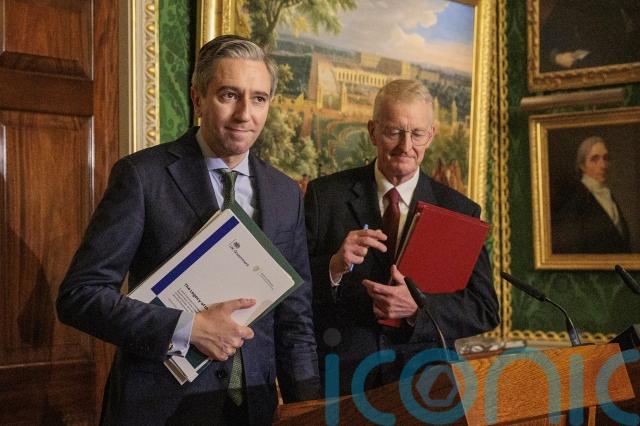
New legacy legislation will address “unfinished business” from the Troubles, Northern Ireland Secretary Hilary Benn said, as he pledged to give grieving families answers.
A commission to investigate Troubles-related killings and a separate information recovery body will be established under the Northern Ireland Troubles Bill.
It comes as the Home Office revealed there are at least 77 people in England, almost half of which were members of the armed forces, whose deaths during the Troubles remain unsolved.
All UK police investigations into Troubles-related killings were shut down in May last year under the previous Conservative government’s Legacy Act, and a new Independent Commission for Reconciliation and Information Recovery (ICRIR) was established.
Labour’s Bill, agreed as part of a framework with the Irish Government, will put in place a reformed Legacy Commission with enhanced powers.
A new statutory advisory group will also be established to ensure victims and survivors of the Troubles, including from a service background, are heard by the Commission.
The Government’s plans received MPs’ support at second reading by 320 votes to 105, majority 215.
Speaking at second reading, Mr Benn gave his assurance that “anyone who was previously involved in paramilitary activity will not be appointed to the victims and survivors group”.
He told the Commons he had heard the call from families and veterans, some of which looked on from Parliament’s galleries, to “get the answers that you seek”.
“We know that this unfinished business falls to us, all of us, because time is running out,” he added.
Mr Benn told MPs: “It seeks to put in place a means of dealing with legacy that can actually command broad public support in Northern Ireland, in particular, for those families who have been trying to find answers for so long.
“And it is needed because the previous government’s legislation, the Northern Ireland Troubles Legacy and Reconciliation Act 2023, whatever its intentions, fundamentally failed.”

The Government is repealing an immunity scheme which formed part of the previous Legacy Act, but which was ruled unlawful in the courts.
“We know that one of the principal reasons for that lack of support was the Act’s attempt to offer immunity from prosecution, including to terrorists who had committed the most appalling murders,” he said.
“There was also anger on the part of many of those who served in Northern Ireland who saw immunity as an affront to the rule of law that they were seeking to protect, and as implying some sort of moral equivalence between those who served in our armed forces and terrorists.
“There is no moral equivalence whatsoever between those members of our armed forces who acted lawfully in carrying out their duties and paramilitaries who were responsible for barbaric acts of terrorism.”
The Home Office said in addition to the 77 unsolved deaths in England, the Police Service of Northern Ireland (PSNI) had shut down more than 1,000 investigations, including 225 investigations into deaths of soldiers and veterans.
The unsolved attacks include:
– The 1974 IRA bombing of a coach on the M62 carrying off-duty British Army personnel and their family members, which killed 12 people and injured 38.
– The assassinations in 1979 and 1990 of MPs Airey Neave and Ian Gow, both in car bombings.
– The 1993 IRA bombing of the shopping district of Warrington in which two children, Tim Parry and Johnathan Ball, were killed and 56 injured.
– The IRA bombings in Guildford (1974), Birmingham (1974) and Manchester (1996).

Dan Jarvis, security minister and former member of the Parachute Regiment who served in Northern Ireland, said: “The last government’s Legacy Act shut down police investigations and proposed immunity for terrorists.
“This left many families feeling they had nowhere to go to continue their search for justice, or simply for answers about what happened to their loved ones.
“This Government’s legislation will put that right.”
However, shadow Northern Ireland secretary Alex Burghart told MPs that the Bill will “reopen old wounds” and that it will “perpetuate disappointment for victims and despair for veterans”.
Mr Burghart said: “The last government chose to draw a line under the litigation of The Troubles, and today that line is being erased.
“The Bill before us today strips out the conditional immunity introduced by the Legacy Act, and it reopens the door to vexatious litigation against veterans, whilst leaving it very unlikely that terrorists will be prosecuted.”
He argued that this will have an impact on recruitment and retention for the Armed Forces, and the UK’s national security.
SDLP MP for Foyle Colum Eastwood signalled he would try to amend the Bill regarding national security and sensitive information, but stressed “we have to give this a chance”.
He said: “If this legislation has any chance of giving people some trust, some truth and some justice, it should be allowed to proceed.
“We have issues around the national security parts of this (Bill), and the issues around sensitive information, and we put proposals and amendments to that regard in the process as we go on.”
The Bill faces further scrutiny at a later date.
Subscribe or register today to discover more from DonegalLive.ie
Buy the e-paper of the Donegal Democrat, Donegal People's Press, Donegal Post and Inish Times here for instant access to Donegal's premier news titles.
Keep up with the latest news from Donegal with our daily newsletter featuring the most important stories of the day delivered to your inbox every evening at 5pm.